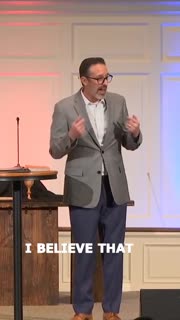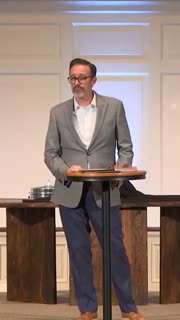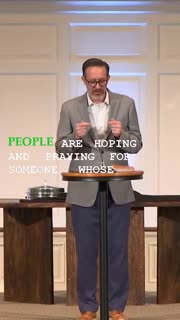Embracing Authenticity in Our Faith Journey
Devotional
Sermon Summary
Bible Study Guide
Sermon Clips
### Quotes for Outreach
1. "I believe that salvation has been offered by God through Jesus who died on a cross. Amen? Amen. And that salvation and that eternal life was sealed the moment Jesus was raised from the dead. Amen? And I believe personally that whatever happens, God's going to finish the work he started. Whatever happens in your life personally, in the life of this country, in the life of this world, we don't have to be anxious. Amen?" [49:33] (36 seconds)
2. "Remember, you are God's plan A for the world. You need to remember that. We are the body of Christ. We've got the power of the Holy Spirit backing us up, amen? We are the body of Christ. And if we are a believer in Jesus, then that makes us His representative. So I'm going to encourage you, represent Him well." [01:15:42] (23 seconds)
3. "Just love. And don't celebrate whenever people get what's coming to them. Instead, protect people. Pray for them. Choose to trust, even when people may not seem that trustworthy. Let your life radiate hope in what God has done. And what God will do in the people around you. Because just as God is working in you, man, He wants to work in that person that's right there next to you. Who you may be so irritated by. God's doing a thing in them." [01:18:13] (31 seconds)
4. "When all is said and done, and all that's left for those people who have followed Jesus, all that's left for us, you know what it is? It's faith. It's hope. And it's love. That's all we have, really. All the toys, all the bills, all the everything, none of that matters. I mean, it matters in our day-to-day life, but at the end of all things, all we have is faith, hope, and love. And you know what the greatest of those is? Love. Hands down." [01:19:25] (33 seconds)
5. "Be authentic. Be genuine. And lean into love. This is what the followers of Jesus do. We love God. We love people. We love ourselves. This is what peace looks like. So imagine if we chose to live into this as a group of believers, right here, right now, now, forever. too could be a city of peace. We want to be people that when they find you, they will see peace." [01:20:07] (39 seconds)
### Quotes for Members
1. "People are hoping and praying for someone whose faith matches their actions. But this isn't new. So we're on a journey through the pilgrimage, pilgrimage to the Holy Land. So we were in Capernaum last week, and this week we travel all the way to the capital of Israel. Jerusalem. Now, Jerusalem is a very ancient city. The earliest mention of Jerusalem is in Genesis 14 when Abraham meets the king of Salem, who is Melchizedek." [56:18] (33 seconds)
2. "What sorrow awaits you, teachers of religious law and you Pharisees? Hypocrites. For you are careful to tithe even the tiniest income from your herb gardens, but you ignore the more important aspects of the law, justice, mercy, and faith. You should tithe, yes, but do not neglect the more important things. Verse 25. What sorrow awaits you, teachers of religious law and you Pharisees? Hypocrites. For you are so careful to clean the outside of the cup and the dish, but inside you're filthy, full of greed and self-indulgence." [01:07:57] (37 seconds)
3. "Our culture is becoming inundated with institutional hypocrisy. People are finding out that church organizations across the country have been covering up sinful behavior from their religious leaders. They're protecting the leaders and they're not protecting the church and the people. They're protecting the institution. They're not protecting the people. These high-profile leaders, and you've seen it on the news, they're falling like dominoes." [01:13:17] (33 seconds)
4. "Are you a sanctuary for the law? Are you a lost in your life? Do people feel safe around you? Do they feel like they have to walk on eggshells so they don't offend you in some way? Do people feel like they can talk to you about some serious spiritual matters? Do they think you're going to listen to them whenever they ask questions that maybe are hard questions? Do they see you as a person who'll listen or one who's going to try to tell them what to think?" [01:15:01] (39 seconds)
5. "These leaders should have blessed people. They should have helped them, fed them, lightened their load. And instead, they heaped extra requirements on them. They took from them. Let's not be like that. Let's lean into love. In fact, let's be people who are patient and kind. Let's not be envious about what we don't have. Let's not be people who brag about what we do have. Let's not be people who brag if our side wins. Pride has no part in love. That's the downfall of everything." [01:16:49] (48 seconds)
Ask a question about this sermon
1. "I believe that salvation has been offered by God through Jesus who died on a cross. Amen? Amen. And that salvation and that eternal life was sealed the moment Jesus was raised from the dead. Amen? And I believe personally that whatever happens, God's going to finish the work he started. Whatever happens in your life personally, in the life of this country, in the life of this world, we don't have to be anxious. Amen?" [49:33] (36 seconds)
2. "Remember, you are God's plan A for the world. You need to remember that. We are the body of Christ. We've got the power of the Holy Spirit backing us up, amen? We are the body of Christ. And if we are a believer in Jesus, then that makes us His representative. So I'm going to encourage you, represent Him well." [01:15:42] (23 seconds)
3. "Just love. And don't celebrate whenever people get what's coming to them. Instead, protect people. Pray for them. Choose to trust, even when people may not seem that trustworthy. Let your life radiate hope in what God has done. And what God will do in the people around you. Because just as God is working in you, man, He wants to work in that person that's right there next to you. Who you may be so irritated by. God's doing a thing in them." [01:18:13] (31 seconds)
4. "When all is said and done, and all that's left for those people who have followed Jesus, all that's left for us, you know what it is? It's faith. It's hope. And it's love. That's all we have, really. All the toys, all the bills, all the everything, none of that matters. I mean, it matters in our day-to-day life, but at the end of all things, all we have is faith, hope, and love. And you know what the greatest of those is? Love. Hands down." [01:19:25] (33 seconds)
5. "Be authentic. Be genuine. And lean into love. This is what the followers of Jesus do. We love God. We love people. We love ourselves. This is what peace looks like. So imagine if we chose to live into this as a group of believers, right here, right now, now, forever. too could be a city of peace. We want to be people that when they find you, they will see peace." [01:20:07] (39 seconds)
### Quotes for Members
1. "People are hoping and praying for someone whose faith matches their actions. But this isn't new. So we're on a journey through the pilgrimage, pilgrimage to the Holy Land. So we were in Capernaum last week, and this week we travel all the way to the capital of Israel. Jerusalem. Now, Jerusalem is a very ancient city. The earliest mention of Jerusalem is in Genesis 14 when Abraham meets the king of Salem, who is Melchizedek." [56:18] (33 seconds)
2. "What sorrow awaits you, teachers of religious law and you Pharisees? Hypocrites. For you are careful to tithe even the tiniest income from your herb gardens, but you ignore the more important aspects of the law, justice, mercy, and faith. You should tithe, yes, but do not neglect the more important things. Verse 25. What sorrow awaits you, teachers of religious law and you Pharisees? Hypocrites. For you are so careful to clean the outside of the cup and the dish, but inside you're filthy, full of greed and self-indulgence." [01:07:57] (37 seconds)
3. "Our culture is becoming inundated with institutional hypocrisy. People are finding out that church organizations across the country have been covering up sinful behavior from their religious leaders. They're protecting the leaders and they're not protecting the church and the people. They're protecting the institution. They're not protecting the people. These high-profile leaders, and you've seen it on the news, they're falling like dominoes." [01:13:17] (33 seconds)
4. "Are you a sanctuary for the law? Are you a lost in your life? Do people feel safe around you? Do they feel like they have to walk on eggshells so they don't offend you in some way? Do people feel like they can talk to you about some serious spiritual matters? Do they think you're going to listen to them whenever they ask questions that maybe are hard questions? Do they see you as a person who'll listen or one who's going to try to tell them what to think?" [01:15:01] (39 seconds)
5. "These leaders should have blessed people. They should have helped them, fed them, lightened their load. And instead, they heaped extra requirements on them. They took from them. Let's not be like that. Let's lean into love. In fact, let's be people who are patient and kind. Let's not be envious about what we don't have. Let's not be people who brag about what we do have. Let's not be people who brag if our side wins. Pride has no part in love. That's the downfall of everything." [01:16:49] (48 seconds)










